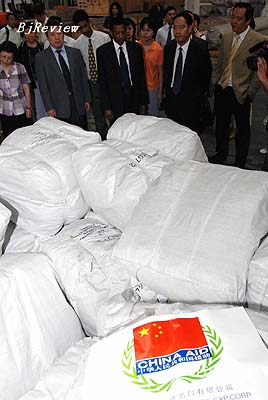|

To present itself to the international community as a responsible country will help China's peaceful development and promote the construction of a harmonious world. However, overly high expectations and excessive responsibilities will undoubtedly add risks to China's development efforts. Jiang Yong, Director of Economic Security Research Center of China Institutes of Contemporary International Relations, expounds on this issue in an article in Outlook Weekly.
China's rapidly rising economic strength has added more influence to the world economy. It is attracting more attention, accompanied by the rising voice for China to shoulder more responsibility as a big power. The so-called responsibility covers many areas. In the economic field, it includes: to maintain current international economic order and rules, to participate in the settlement of increasingly serious global imbalance and environmental problems, to expand the opening of financial sectors, to promote the market-oriented reform, to improve the social security network, to tangibly transform the economic growth mode and to increase aid to other countries.
Objectively, it is because the "China factor" is prevailing around the globe that the international community demands the country to shoulder the responsibility of "a big power." It is estimated that China will overtake Germany as the third largest economy in 2008. With the remarkable economic growth, China's influence on the world economy also greatly increases. China's GDP only accounts for 5 percent of the world's total amount, but one third of the increment in global economic aggregate comes from China. Thus, in the past four years, 50 percent of the additional demand for economically sensitive commodities (such as oil, aluminum, lead, copper, iron and tin) should be attributed to China. For a long time, China has always been playing a passive role in the international financial market, but since 2007, some of China's stock price fluctuations have had a direct impact on Asian and European and even U.S. stock markets.
China is a beneficiary of economic globalization. Therefore, to respect existing international economic order and rules and to participate in the settlement of the worsening global imbalance also benefit China. To shoulder moderate international responsibility within China's capacity will not only promote world peace, development and cooperation but also create a favorable international environment for China's sustainable economic development.
However, it is the fast economic globalization, uneven development levels and the unreasonable international economic order that are responsible for the current imbalance of the world's economy.
Although China has achieved remarkable results in terms of economic aggregate, its per-capita national income ranks 110th on the world list, about 4 percent that of the United States, 5 percent of Japan and 10 percent of the Republic of Korea. In accordance with the universally accepted poverty line, China now has 135 million impoverished people who have a daily income no more than $1, making up 10.4 percent of the whole national population and accounts for 18 percent of the world's 750 million absolute poor people.
China's striking performance in foreign trade and large foreign investment are based on huge resource and environment costs as well as the deterioration of workers' health. Therefore, to improve people's living conditions will remain a long-term task for the Chinese Government and Chinese people. China still has a very long way to go before it becomes a strong economic, or even, a financial power.
China has always been a credible country, carefully fulfilling commitments to the international community (like the commitment of opening for WTO accession). However, China must be very careful about the reform and opening items concerning state economic sovereignty and national economic security, which are always demanded by Western countries. Financial collapses in Latin America and Southeastern Asia indicate that financial liberalization reform should come after macro economic and trade liberalization. Without well-developed systems, not only will the economic efficiency be affected but also financial crisis is likely to occur.
In addition, ecological environment disasters resulting from global warming and the rising resource prices are attracting more and more attention from the international community. China is supposed to solve these severe problems together with the international community. However, it must be noticed that the industrialization and comfortable lifestyle in the developed world costs the planet the vast majority of global resources, which results in severe environmental problems. It's unfair and unreasonable for developed countries to accuse China and other developing countries of causing an environmental crisis and thus asking China to shoulder the responsibility as "a big power." Together with other developing countries, China has the right to develop. To ask China to undertake excessive responsibilities in terms of resource conservation and environmental protection as "a big power" will hamper the country's development. |
